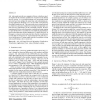Free Online Productivity Tools
i2Speak
i2Symbol
i2OCR
iTex2Img
iWeb2Print
iWeb2Shot
i2Type
iPdf2Split
iPdf2Merge
i2Bopomofo
i2Arabic
i2Style
i2Image
i2PDF
iLatex2Rtf
Sci2ools
112
click to vote
VISUALIZATION
2005
IEEE
2005
IEEE
Opening the Black Box - Data Driven Visualization of Neural Network
Arti cial neural networks are computer software or hardware models inspired by the structure and behavior of neurons in the human nervous system. As a powerful learning tool, increasingly neural networks have been adopted by many large-scale information processing applications but there is no a set of well de ned criteria for choosing a neural network. The user mostly treats a neural network as a black box and cannot explain how learning from input data was done nor how performance can be consistently ensured. We have experimented with several information visualization designs aiming to open the black box to possibly uncover underlying dependencies between the input data and the output data of a neural network. In this paper, we present our designs and show that the visualizations not only help us design more ef cient neural networks, but also assist us in the process of using neural networks for problem solving such as performing a classi cation task.
Cial Neural Networks | Cient Neural Networks | Neural Networks | Visualization | VISUALIZATION 2005 |
| Added | 25 Jun 2010 |
| Updated | 25 Jun 2010 |
| Type | Conference |
| Year | 2005 |
| Where | VISUALIZATION |
| Authors | Fan-Yin Tzeng, Kwan-Liu Ma |
Comments (0)

